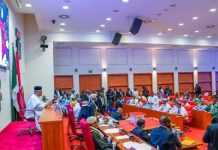The Federal Government is currently pursuing a $1 million grant from the African Development Bank (AfDB) to provide emergency food assistance to Nigerians impacted by the 2024 floods.
This initiative aims to address the significant displacement and food insecurity caused by the disaster, which affects 29 states, displaces over 200,000 people, and destroys more than 500,000 hectares of farmland.
The plan targets 122,253 individuals in 16 of the most severely affected districts, offering food packages that include 25kg of rice and 10kg of beans. The food distribution is set to take place between October 2024 and February 2025, supplementing the Federal Government’s ongoing relief efforts, which have already provided rice and spaghetti to affected households.
The proposal states that the project seeks to complement the government’s relief efforts and those of development partners in saving lives and safeguarding livelihoods during the current crisis. The AfDB, through its Special Relief Fund (SRF), plans to contribute $1 million, while the World Food Programme (WFP) will deploy its field expertise to identify beneficiaries and coordinate the food distribution.
Allocation of $1 Million AfDB Grant
Out of the total grant, $870,919 is designated for the purchase and transport of food supplies, covering 799.046 metric tons of cereals and beans. This expenditure accounts for the bulk of the funding to provide critical food support to the most affected households across 16 districts. Additionally, $48,421 is set aside for project implementation costs, including logistics managed by WFP field offices.
Another $42,198 covers direct support costs, which include management expenses at the WFP Country Office. The remaining $38,462, or 4% of the total grant, goes toward indirect support costs as per WFP’s guidelines, ensuring proper oversight and accountability throughout the program.
AfDB and WFP Lead Relief Operations
The AfDB’s contribution will facilitate food procurement and distribution, with the WFP leading field activities, such as beneficiary targeting and food delivery. This intervention aims to supply 35kg of food per household to ensure dietary diversity and address nutritional needs during the four critical recovery months.
Flooding, exacerbated by the collapse of the Alau Dam in Borno State, severely impacts northern Nigeria. In Maiduguri, over half the city remains submerged, disabling essential infrastructure, including the Maiduguri Teaching Hospital and 25 schools. The disaster also triggers outbreaks of waterborne diseases like diarrhea and malaria, further worsening the situation for vulnerable communities.
The National Emergency Management Agency (NEMA) describes the situation as beyond the government’s capacity, highlighting the urgent need for international assistance. President Bola Tinubu has previously called for global support to manage this humanitarian crisis that strains local resources.
Focus on Direct Food Assistance
Due to rising food prices identified by the Food and Agriculture Organisation, cash-based aid proves less effective, prompting the AfDB to focus on direct food transfers. This approach aligns with ongoing United Nations-led efforts to mitigate the socio-economic impact of the floods, which exacerbate Nigeria’s already fragile economic conditions.
The AfDB grant covers the costs associated with food procurement, logistics, and distribution operations. Post-distribution monitoring will assess the program’s impact on food security and the well-being of beneficiaries.
Additional Support and Background
The United States, through USAID, has previously committed over $6.5 million to support flood-related humanitarian efforts in Nigeria, adding to nearly $100 million in total aid for various crises.
In Borno State, despite receiving about N816.34 million from the Ecological Fund in the first half of 2024, only N20 million has been spent on flood control, representing just 2.45% of its allocated funds. The revised 2024 budget allocates N1.653 billion for flood and erosion control, but only 1.2% of this budget has been utilized, raising concerns over the state’s preparedness and resource management.













